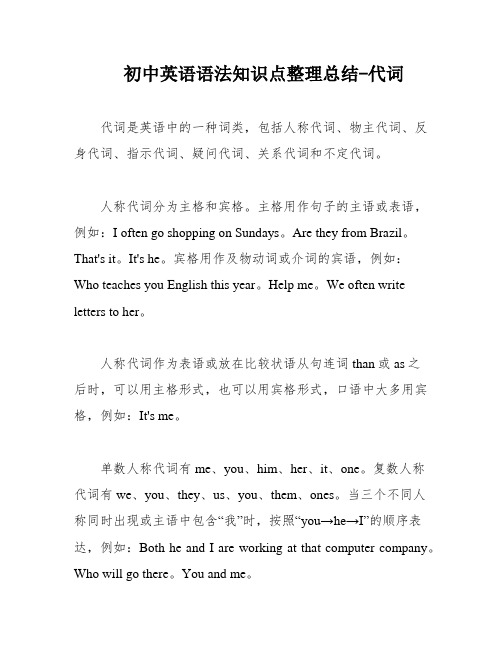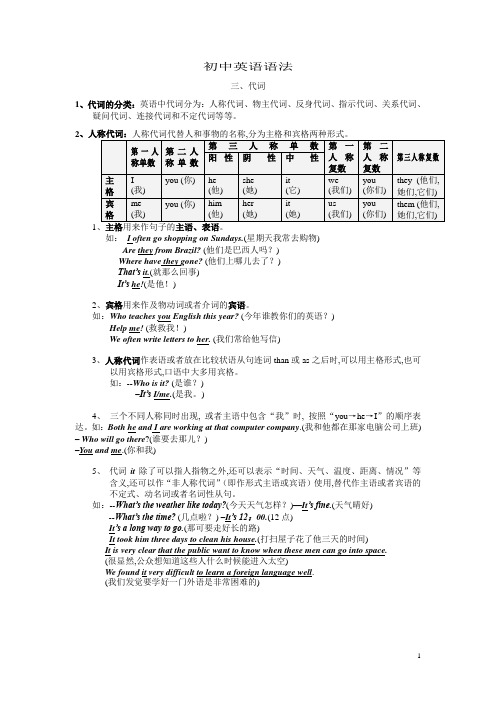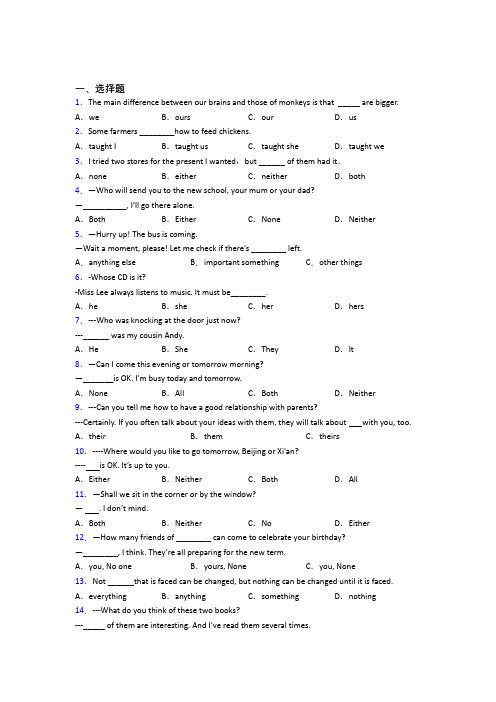初中英语语法知识—代词的知识点(3)
初中英语语法知识点整理总结-代词

初中英语语法知识点整理总结-代词代词是英语中的一种词类,包括人称代词、物主代词、反身代词、指示代词、疑问代词、关系代词和不定代词。
人称代词分为主格和宾格。
主格用作句子的主语或表语,例如:I often go shopping on Sundays。
Are they from Brazil。
That's it。
It's he。
宾格用作及物动词或介词的宾语,例如:Who teaches you English this year。
Help me。
We often write letters to her。
人称代词作为表语或放在比较状语从句连词than或as之后时,可以用主格形式,也可以用宾格形式,口语中大多用宾格,例如:It's me。
单数人称代词有me、you、him、her、it、one。
复数人称代词有we、you、they、us、you、them、ones。
当三个不同人称同时出现或主语中包含“我”时,按照“you→he→I”的顺序表达,例如:Both he and I are working at that computer company。
Who will go there。
You and me。
人称代词it除了可以指人指物之外,还可以表示“时间、天气、温度、距离、情况”等含义,此外还可以作为“非人称代词”使用,替代作主语或宾语的不定式、动名词或名词性从句,例如:What's the weather like today。
It's fine。
What's the time。
It's 12:00.为反身代词的作用是强调动作的执行者与承受者是同一人或同一事物。
反身代词通常位于动词或介词后面。
如:I XXX XXX XXX(我在打篮球时弄伤了自己。
)He always talks to himself when he is alone。
(他独自一人时总是自言自语。
中考代词知识点总结

中考代词知识点总结一、人称代词人称代词用来表示说话人、听话人和与说话人或听话人有关的人或事物。
在中考英语考试中,人称代词的使用是非常常见的。
1. 主格形式:I, you, he, she, it, we, they。
例如:I am a student.You are my friend.He is a teacher.She is my sister.It is a cat.We are in the same class.They are good students.2. 宾格形式:me, you, him, her, it, us, them。
例如:He likes me.I see you.We help him.She loves her.It follows it.They call us.I miss them.3. 形容词性物主代词:my, your, his, her, its, our, their。
例如:This is my book.Is this your dog?That is his bike.Her name is Lily.Its color is yellow.Our teacher is strict.Their parents are doctors.4. 名词性物主代词:mine, yours, his, hers, its, ours, theirs。
例如:This book is mine.Is this dog yours?The bike is his.The cat is hers.The house is ours.The toys are theirs.5. 反身代词:myself, yourself, himself, herself, itself, ourselves, themselves。
例如:I see myself in the mirror.You should do it yourself.He hurt himself.She enjoys herself.It cleans itself.We find ourselves lost.They talk to themselves.二、指示代词指示代词用来指示人或物,常见的指示代词有this, that, these, those等。
代词知识点总结简单版

代词知识点总结简单版一、代词的分类1. 人称代词人称代词用来代替表示人或物的名词,分为主格、宾格、所有格和反身代词。
主格人称代词作为主语,宾格人称代词作为宾语,所有格人称代词表示所有关系,反身代词表示主语和宾语在同一个人上。
2. 物主代词物主代词用来表示所属关系,有形式和主体两种形式。
形式物主代词在句中作定语,主体物主代词在句中作宾语或表语。
3. 反身代词反身代词表示动作的主体同时也是动作的宾语,常用来表示主语对宾语的动作是自己。
4. 指示代词指示代词用来指示表示人或物的名词,分为远指代词和近指代词。
5. 疑问代词疑问代词用于提问句,询问人或物的种类、性质、数量或程度。
6. 关系代词关系代词引导定语从句,与先行词相互关联,并在从句中作主语、宾语、表语等成分。
7. 不定代词不定代词用来指代未具体确定的人或物,表示不确定的数量或程度。
二、代词的用法1. 主语位置人称代词、物主代词、反身代词、疑问代词、不定代词和指示代词都可以在句子中作主语。
2. 宾语位置人称代词、物主代词、反身代词、指示代词、疑问代词、关系代词和不定代词都可以在句子中作宾语。
3. 表语位置反身代词、指示代词、不定代词和关系代词可以在句子中作表语。
4. 定语位置指示代词、疑问代词、关系代词和不定代词可以在句子中作定语。
5. 各种代词的性数格变化人称代词、物主代词和指示代词根据其所指的名词的性数格的不同而有相应的变化。
如:he/him/his/himself; she/her/her/herself; it/its/it/itself; they/them/their/themselves等。
三、代词的使用注意事项1. 主谓一致当代词作主语时,应与谓语动词在人称和数上保持一致。
如:She is a student. They are students.2. 宾语位置当代词作宾语时,要注意宾格人称代词的使用,如:I like her. Can you help me?3. 定语位置指示代词、疑问代词、关系代词和不定代词在作定语时,应该放在其所修饰的名词之前。
初中英语知识点归纳代词的不定代词和疑问代词的用法

初中英语知识点归纳代词的不定代词和疑问代词的用法代词在英语中起到替代名词的作用,可以简化语言表达并避免重复。
在这篇文章中,我们将介绍代词的种类以及不定代词和疑问代词的用法。
一、代词的种类代词分为人称代词、物主代词、指示代词、不定代词和疑问代词。
二、人称代词人称代词用来代替人物。
主要分为主格和宾格两种形式。
主格:I(我)、you(你)、he(他)、she(她)、it(它)、we (我们)、they(他们/她们/它们)宾格:me(我)、you(你)、him(他)、her(她)、it(它)、us(我们)、them(他们/她们/它们)三、物主代词物主代词用来表达所属关系。
分为形容词性物主代词和名词性物主代词两种形式。
形容词性物主代词:my(我的)、your(你的)、his(他的)、her(她的)、its(它的)、our(我们的)、their(他们/她们/它们的)名词性物主代词:mine(我的)、yours(你的)、his(他的)、hers(她的)、its(它的)、ours(我们的)、theirs(他们/她们/它们的)四、指示代词指示代词用于指示特定的人或事物。
分为单数和复数两种形式。
单数:this(这个)、that(那个)复数:these(这些)、those(那些)五、不定代词不定代词用来表示不确定的人或物,没有特定的指向。
常用的不定代词有:some(一些)、any(任何)、no(没有)、every(每个)、all(所有)、none(没有人/没有东西)、few(一些)、many(许多)、several(几个)、both(两者都)、either(两者之一)、neither(两者都不)、one(一个)六、疑问代词疑问代词用来提问。
常用的疑问代词有:who(谁)、whom(谁,宾格)、what(什么)、which(哪个)、whose(谁的)七、不定代词的用法1. some和any- some用于肯定句中,表示某种程度的数量或程度; - any用于否定句和疑问句中,表示任何或任何一些。
初中英语语法(三)代词

初中英语语法三、代词1、代词的分类:英语中代词分为:人称代词、物主代词、反身代词、指示代词、关系代词、疑问代词、连接代词和不定代词等等。
21如:I often go shopping on Sundays.(星期天我常去购物)Are they from Brazil? (他们是巴西人吗?)Where have they gone? (他们上哪儿去了?)That’s it.(就那么回事)It’s he!(是他!)2、宾格用来作及物动词或者介词的宾语。
如:Who teaches you English this year? (今年谁教你们的英语?)Help me! (救救我!)We often write letters to her. (我们常给他写信)3、人称代词作表语或者放在比较状语从句连词than或as之后时,可以用主格形式,也可以用宾格形式,口语中大多用宾格。
如:--Who is it? (是谁?)–It’s I/me.(是我。
)4、三个不同人称同时出现, 或者主语中包含“我”时, 按照“you→he→I”的顺序表达。
如:Both he and I are working at that computer company.(我和他都在那家电脑公司上班) –Who will go there?(谁要去那儿?)–You and me.(你和我)5、代词it除了可以指人指物之外,还可以表示“时间、天气、温度、距离、情况”等含义,还可以作“非人称代词”(即作形式主语或宾语)使用,替代作主语或者宾语的不定式、动名词或者名词性从句。
如:--What’s the weather like today?(今天天气怎样?)—It’s fine.(天气晴好) --What’s the time?(几点啦?)–It’s 12:00.(12点)It’s a long way to go.(那可要走好长的路)It took him three days to clean his house.(打扫屋子花了他三天的时间)It is very clear that the public want to know when these men can go into space.(很显然,公众想知道这些人什么时候能进入太空)We found it very difficult to learn a foreign language well.(我们发觉要学好一门外语是非常困难的)3如:Is that your umbrella? (那是你的伞吗?)I often go to see my aunt on Sundays. (我经常在星期天去看望阿姨)They are their books.(是他们的书)2、名词性物主代词相当于名词,既代替事物又表明所属关系,在句子中往往独立地作主语、宾语或者表语,后面千万不可以跟名词。
人教版初中英语语法知识学习课件PPT之代词语法学习PPT

are my sister’s.
考点学习
归纳拓展 (1)that/those, one/ones: ①that指代上文提及的单数可数名词或不可数名词;those指代上文提及的 复数可数名词。如:
·The water in the cup is hotter than that in the bottle. ·The values of today’s young people are different from those of their parents.
考点学习
(3)名词性物主代词可以作主语、表语和宾语,其后不能跟名词。名词 性物主代词相当于"形容词性物主代词+名词"。如: —Whose camera is this? Is it yours? —No, it’s not mine. It’s his.[2022天津中考]
考点学习
反身代词 (1)反身代词可以在句中作宾语、同位语。如: ·Be careful! Don’t hurt yourself! ·The matter itself is not serious.
人教版初中英语语法知识学习课件PPT Nhomakorabea代词语法学习
图解语法
考点学习
考点 1 人称代词、物主代词和反身代词
类别 第一人称 第二人称
单数 复数 单数 复数
人称代词 主格 宾格
I me we us you you you you
物主代词
形容词性 名词性
my
mine
our
ours
your
yours
your
himself herself itself themselves
考点学习
初中英语语法梳理和提高---代词复习总结与精讲(含答案)

初中英语语法梳理和提高---代词总结与精讲(含答案)代词知识梳理:提纲挈领,抓住重点和难点!一、代词的分类英语中常把代词分为人称代词、无主代词、反身代词、指示代词、疑问代词、连接代词、不定代词和相互代词。
二、代词的用法1.人称代词:人称代词是指人的代词,有性、数、格的区别。
表示“我” “你” “他” “我们” “你们” “他们”。
请看下表:(1)(2)宾格在句中作宾语。
例如:They don’t want me to go there alone.Don’t worry. I can lo ok after her.(3)宾格还可以作宾格。
特别是在口语中。
例如:--- Who’s that? --- It’s me.注意:①人称代词we, you, they 可以用来表示一般人。
例如:You cannot go into the hall with slippers. 不准穿拖鞋进入大厅。
②人称代的主格作表语,一般都在正中的谈话中,表示强调。
例如:It was he who took away the necklace. 是他拿走了那条项链。
③人称代词she可以用指代祖国、大地、月亮、轮船等。
例如:The ship is leaving. She’s on her first trip to Boston. 轮船要起航了。
这时她第一次去波士顿。
We love our country, we hope she’ll be stronger and stronger. 我们热爱我们的祖国,我们希望她越来越强大。
④It作为人称代词时,可以表示天气、距离、时间、环境等。
例如:It is about 10 kilometres from here. 离这儿大约有10公里。
⑤It 还可用作形式主语或形式宾语,来代替由不定式,动词的-ing,形式或主语从句构成的真正的主语或宾语,以避免句子头重脚轻。
例如:It is not easy to learn English well.It is good for you taking a walk after supper.I found it difficult to sleep.⑥英语里当主语是并列的几个人时,人称代词的排列顺序和汉语不同,I 在最后,you 在最前;但是,当受到批评或时承认错误时正好相反,I 在最前,you在最后。
初中英语语法知识—代词的知识点总复习含答案解析(3)

16.My grandparents live in the countryside. We often go to see ______.
A.himB.themC.herD.you
17.Some people are interested in _______women’s sense of smell is better developed than _____of men.
【点睛】
all所有,三者或三者以上都
both两者都
either(两者中)任一的
neither两者都不
each(两个或两个以上)每个,每一
none(三个或三个以上)都不
All of my friends come to visit me.(朋友大于或等于3个)
both sides of the road道路的两边
10.A
解析:A
【解析】
【分析】
【详解】
句意:——明天你想去哪里,北京还是西安?——两个都可以。由你决定。考查不定代词辨析题。either二者择其一;neither两者都不,表否定;both两者都;all全都。both和all都需用复数动词形式,和is不搭配,可排除CD两项。根据OK,可知是肯定句,故选A。
A.taught IB.taught usC.taught sheD.taught we
3.I tried two stores for the present I wanted,but ______ of them had it.
A.noneB.eitherC.neitherD.both
4.—Who will send you to the new school, your mum or your dad?
- 1、下载文档前请自行甄别文档内容的完整性,平台不提供额外的编辑、内容补充、找答案等附加服务。
- 2、"仅部分预览"的文档,不可在线预览部分如存在完整性等问题,可反馈申请退款(可完整预览的文档不适用该条件!)。
- 3、如文档侵犯您的权益,请联系客服反馈,我们会尽快为您处理(人工客服工作时间:9:00-18:30)。
一、选择题1.Do you have ___ready for the spring trip?No. I still have to buy some fruit.A.something B.anything C.everything D.nothing2.I ate ______ at lunch because the food was terrible.A.anything B.nothing C.something D.everything 3.—Hurry up! The bus is coming.—Wait a moment, please! Let me check if there’s ________ left.A.anything else B.important something C.other things 4.—Hi, Jack. Is this your dictionary?—No. is over there. It’s a present from my uncle.A.Mine B.Yours C.My D.Your5.---What do you think we can do for our aged parents?---You don’t have to do __________except to be with them and be yourself. A.something B.anything C.everything D.nothing 6.— Is there anything to drink in the fridge? — No, there is _____ left.A.all B.both C.neither D.none 7.Helen has got two brothers. _____ of them likes chocolate, but she loves it. A.Neither B.None C.Each D.Any 8.—Can I come this evening or tomorrow morning?—_______is OK. I’m busy today and tomorrow.A.None B.All C.Both D.Neither 9.Mr. Wang recommended me a few foreign movies, but ____was to my taste.A.all B.neither C.nothing D.none10.---Lisa, would you like to climb Yuelu Mountain with me tomorrow?---I'd love to, but I have the driving test tomorrow. Let’s make it day.A.other B.another C.the other11.The main difference between our brains and those of monkeys is that _____ are bigger. A.we B.ours C.our D.us 12.—How many friends of ________ can come to celebrate your birthday?—________, I think. They’re all preparing for the new term.A.you, No one B.yours, None C.you, None13.My parents showed some old pictures that brought back sweet memories.A.I B.me C.my D.mine 14.Life is full of ups and downs, and without the downs, the ups will mean A.something B.everything C.anything D.nothing 15.Mike and Ted are twins. ______ are from Australia.A.We B.You C.They D.Them16.--The story is so amazing! It’s the most interesting story I’ve ever read.--But I’m afraid it won’t be liked by________.A.everybody B.somebody C.anybody D.nobody 17.Don' t you think _ _ necessary for friends to trust each other?A.one B.that C.those D.it18.—I can’t believe Jim got first in the competition.— As you know, God helps those who help ______.A.yourself B.himself C.yourselves D.themselves19.Some people are interested in _______women’s sense of smell is better developed than _____of men.A.which; that B.what; one C.which; one D.whether; that 20.I can’t find my pen.Could you help______ find it ?A.me B.I C.myself D.mine21.I always believe that is difficult if we try our best to do it.A.something B.anything C.everything D.nothing 22.-- I like the two dresses, but I can only afford ______ of them.-- I suggest you take the white one.A.allB.bothC.neitherD.either23.--What about these two coats, madam?--________ of them fits me. Could you show me ________ one?A.Either; other B.Neither; another C.Neither; else D.Either; another 24.My mother is a teacher. She loves students very much.A.her B.his C.my D.your25.—Which do you prefer, coffee or tea.—_________, thanks. I’d like a cup of tea.A.Either B.Both C.Neither D.None【参考答案】***试卷处理标记,请不要删除一、选择题1.C解析:C【解析】【详解】句意:春游的一切准备好了吗?还没。
我还得去买些水果。
考查复合代词。
something “某事、某物”通常用于肯定句中;anything“任何事物”通常用于否定句和疑问句中;e verything“每件事”;nothing“没有什么”;根据句意“一切都准备好”have everything ready,故选C。
2.B解析:B【解析】【分析】【详解】句意:我午饭什么也没吃,因为食物很难吃。
考查不定代词。
A. anything任何事情,用于否定句和疑问句中;B. nothing没有东西,用于肯定句中表示否定;C. something一些事或物;D. everything每件事情。
根据后面的because the food was terrible,可知是我午饭什么也没吃,所以nothing符合题意,故答案选B。
3.A解析:A【解析】【分析】【详解】句意:-快点!公共汽车就要来了。
-请稍等,让我检查一下是否有重要的东西落下了。
anything else其他的任何东西;important something形式错误,形容词应放在不定代词之后;other things其他的东西。
there’s是there is的缩写,主语应该是单数的,故C不对,应选A。
4.A解析:A【解析】【详解】句意:——你好,杰克。
这是你的字典吗?——不是,我的在那边。
这是我叔叔送我的礼物。
考查名词性的物主代词。
A. Mine我的,名词性的物主代词;B. Yours你的、你们的,名词性的物主代词;C. My我的,形容词性的物主代词;D. Your你的、你们的,形容词性的物主代词。
根据语境“——你好,杰克。
这是你的字典吗?——不是,….在那边。
这是我叔叔送我的礼物。
”可知此处句意为“我的在那边。
”设空处后面没有名词,所以应用名词性的物主代词mine,相当于my dictionary;结合选项可知A选项符合题意,故答案选A。
5.B解析:B【解析】【详解】句意“-你认为我们能为我们年迈的父母做一些什么事情?-除了和他们在一起并且成为你自己外,你不需要做任何事”。
A.用于肯定句中译为“一些事情”,用于疑问句中表示建议,并希望得到对方肯定回答,译为“一些事情”;B.用于肯定句中译为“任何事情”,用于疑问句和否定句中译为“一些事情”;C.每一个事情;D.没有事情。
根据句意可知,表示“除了和他们在一起和成为你自己之外,你不必做任何事情”。
且在否定句中,故选B。
6.D解析:D【解析】【分析】【详解】句意:----冰箱里有什么喝的吗?------不,已经没剩什么东西了。
考查不定代词。
A. all一切,全部,都(三者及以上);B. both(两者及以上)都,两个;C. neither(两者)都不,没有任何东西(两者);D. none(三者及以上)都不,一个也没有,没有任何东西。
根据否定回答No,可知“已经没剩什么东西了。
(应指三者及以上)”;结合句意可知填none;选D。
7.A解析:A【解析】试题分析:句意:海伦有两个哥哥。
他们都不喜欢巧克力但是她喜欢巧克力。
A. Neither两者都不;B. None三者或者三者以上都不;C. Each 两个或者两个以上中的每一个;D. Any任何一个。
